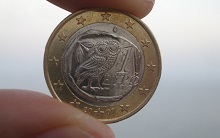De politicus van het jaar is al verkozen; het was wederom premier Rutte. Het woord van het jaar is ook bekend: ‘tuigdorp’. Is er ook een verkiezing voor de meest destructieve term van het jaar? Nee, dus heb ik hem zelf maar uitgeschreven.
De winnaar is: moral hazard. Jammer genoeg is dat geen Nederlandse term. Een goede vertaling ken ik zo snel niet. Letterlijk betekent het: ‘moreel risico’, maar dat klinkt nergens naar.
De Engelse term moral hazard verwijst naar gedrag. Als iemand geen direct risico loopt door zijn daden, dan kan hij of zij er een potje van maken. Verzekeringsagenten vrezen dat hun klanten zich roekelozer gaan gedragen. Economen vrezen dat landen zichzelf niet financieel in de hand kunnen houden als er geen sancties staan op slecht gedrag.
De term kwam op toen duidelijk werd dat Griekenland in de problemen kwam. Het land had er financieel een potje van gemaakt. Als snel werd geroepen dat de steun aan Griekenland moest worden opgezegd of dat het land uit de eurozone moest worden geknikkerd.
Moral hazard sloeg nu op het idee dat meer geld naar de Grieken slechts tot voortzetting van het ongewenste gedrag zou leiden. De Grieken moesten eerst orde op zaken stellen. Daarna zouden we wat overmaken.
Wilders fulmineerde het hardst: ‘geen cent’ Nederlands belastinggeld mocht er worden overgemaakt aan ‘het corrupte Griekenland’. De eis van de PVV was duidelijk: ‘het totaal zinloze beleid, om de noodlijdende Grieken telkens opnieuw overeind te houden met geld uit onder andere ons land, moet stoppen’.
Het kabinet, dat nu eenmaal door de PVV wordt gedoogd, was ook niet happig op steun aan de Grieken. Premier Rutte en zijn minister van financiën De Jager hebben zich met bondskanselier Merkel en de (ex-)directeur van de Europese Centrale Bank Trichet lang verzet tegen krachtdadige maatregelen om Griekenland te redden. Dat had makkelijk gekund, want de Griekse economie omvat slechts 2,5 procent van de totale economie van Europa.
Door te blijven eisen dat de Grieken eerst orde op zaken zouden stellen werd weliswaar een deel van het electoraat bevredigd, maar ging kostbare tijd verloren.
Al anderhalf jaar geleden, op 2 mei 2010, werd het besluit genomen om 110 miljard euro aan Griekenland te lenen. De financiële markten waren niet onder de indruk. Op 21 juni 2011 werd opnieuw een pakket maatregelen voorgesteld. Griekenland stond op de rand van de afgrond en erger, de besmetting van Italië dreigde. De financiële markten waren wederom niet onder de indruk. Het noodfonds bleek te klein. De besmetting van Italië was een feit.
Het jaar 2011 werd een keerpunt. De Amerikaanse kredietcrisis escaleerde via een schuldencrisis in de zuidelijke euroregio, naar een Europese politieke crisis – die het voorbestaan van de euro en de EU bedreigt.
Als politici uit de noordelijke eurolanden meer leiderschap hadden getoond, naar experts hadden geluisterd, zich niet hadden laten leiden door simplistische angst voor moral hazard en begin 2011 in één klap de Griekse crisis hadden opgelost, was het vertrouwen van de markten gewonnen. Ja, dán hadden we met een gerust hart 2012 in kunnen gaan.
Trouw






